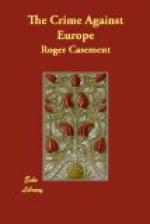The French writer here saw deeper and spoke truer than many who seek to-day not to reveal the Irish heart, whose deep purpose they have forgotten, but barter its life-blood for a concession that could be won to-morrow by half that blood if shed at home, thus offered without warrant “as a new weapon of offence to England’s hands against the freedom of the world elsewhere.”
The Irishman, who in the belief that Home Rule has come or that any measure of Home Rule the London Parliament will offer can be a substitute for his country’s freedom, joins the British army or navy is a voluntary traitor to his country. Almost everything that Ireland produces, or consumes, must all go out or come solely through England and on payment of a transit and shipping tax to English trade.
The London press has lately waxed indignant over Servia denied by Austria a port on the Adriatic, and we have been told a Servia without a port is a Servia held in “economic slavery,” and that her independence is illusory unless she have free outlet to the sea. But what of Ireland? With not one, but forty ports, the finest in all Western Europe, they lie idle and empty. With over 1,000 miles of seaboard, facing the West and holding the seaway between Europe and America, Ireland, in the grip of England, has been reduced to an economic slavery that has no parallel in civilization.
And it is to this island, to this people that the appeal is now made that we should distrust the Germans and aid our enslavers. Better far, were that the only outcome, the fate of Alsace-Lorraine (who got their Home Rule Parliament years ago) than the “friendship” of England. We have survived the open hate, the prolonged enslavement, the secular robbery of England and now the England smiles and offers us with one hand Home Rule to take it away with the other, are we going to forget the experience of our forefathers? A Connacht proverb of the Middle Ages should come back to us—“Three things for a man to avoid; the heels of a horse, the horns of a bull; and the smile of an Englishman.”
That Ireland must be involved in any war that Great Britain undertakes goes without saying; but that we should willingly throw ourselves into the fray on the wrong side to avert a British defeat, is the counsel of traitors offered to fools.
We must see to it that what Thierry wrote of our fathers is not shamefully belied by their sons. Our “indomitable persistency” has up to this excelled and subdued the unvarying will applied to one unvarying purpose of those who, by dint of that quality, have elsewhere subjugated the universe. We who have preserved through centuries of misery, the remembrance of lost liberty, are not now going to merge our unconquered souls in the base body of our oppressor.
One of the few Liberal statesmen England has produced, certainly the only Liberal politician she has ever produced, the late Mr. Gladstone, compared the union between Great Britain and Ireland to “the union between the mangled corpse of Hector and the headlong chariot of Achilles.” (1890.)




